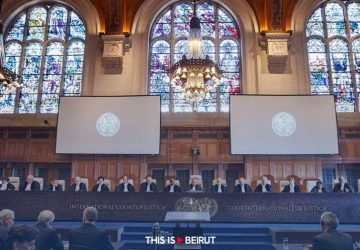Listen to the article
The growing local discontent with Israeli Prime Minister Benjamin Netanyahu exceeds that observed outside Israel’s borders, due to the endless internal rifts within his government and the string of failures in his performance since the Al-Aqsa Flood attack against Israel on October 7. Could his ousting become a much needed and unavoidable step? One that could lead to a ceasefire, a reconciliation and ultimately a permanent settlement? Given the sharp discord within the Israeli government, could the rifts – especially if prominent figures like Benny Gantz step down – ultimately dissolve the cabinet (commonly referred to as the “war cabinet”) and lead to the resignation of Benjamin Netanyahu’s cabinet? These internal divisions have starkly exposed the contrasting divisions within the Israeli government between those aligned with the Israeli PM, namely the extremist advocates for military action to dismantle Hamas and Hezbollah, the proponents of moderation, and those supporting a peaceful resolution, including recognition of two states and comprehensive peace.
In the wake of escalating tensions between the US administration and Netanyahu, political turmoil swept through Israel. This resulted in the unprecedented suspension of direct communication between Joe Biden and Netanyahu, marking a first in the history of their bilateral diplomatic relations. In this context, the Biden administration issued warnings to Netanyahu regarding his performance, mainly his reluctance to endorse a “Ramadan ceasefire.” The situation escalated to the point where the US Congress refrained from voting on a resolution in support of Israel. Furthermore, the Biden administration did not extend a formal invitation to Netanyahu after the formation of his government for the usual visit to Washington. Instead, Benny Gantz, a member of the cabinet, visited the US capital, delivering a powerful blow to Netanyahu and exposing the fraught relationship between Biden and the Israeli PM. Consequently, the latter refused to acknowledge the visit as an official one, despite prior notification from Gantz. Netanyahu even went as far as instructing Israel’s ambassador to Washington, Michael Herzog, to abstain from arranging meetings for Gantz and not to escort him during official engagements. Sending a clear message to the US administration, Netanyahu emphasized, “There is only one leader in Israel.” Nevertheless, Gantz was well-received by US officials.
Some observers view March 4 as the starting point of the presidential battle between Gantz and Netanyahu. Washington is seeking allies within Israel who follow a moderate political line, conform with its strategic objectives and advocate for pragmatic approaches to advance regional stability. Netanyahu’s opposition to Biden’s regional initiatives has cast a shadow over his presidential ambitions. The warm welcome granted to Benny Gantz, despite the Israeli Prime Minister’s objections, highlights Biden’s stance against Netanyahu and his determination to sideline him and his hardline administration — a goal that the US president has pursued since taking office.
Insider sources reveal that the political rift in Israel stems from Netanyahu’s unilateral decision-making and obstruction of a “Ramadan ceasefire,” against Washington’s will. In fact, Netanyahu did not inform his coalition partners about the details or conditions of the ceasefire negotiations, which many observers deemed unrealistic. This lack of transparency led to a stalemate in the ceasefire agreement, further complicating the situation. Netanyahu’s opponents have grown weary of his performance, compounded by his battle against judicial independence as well as his strained relations with the military leadership.
Within opposition circles, there’s a prevailing belief that the government’s collapse is imminent, amid unprecedented challenges facing Israel. Furthermore, a majority of Israelis, seeking accountability from Netanyahu, are calling for early elections. In fact, his government is being held accountable for tarnishing Israel’s military image, leading to resounding calls for a new government able to facilitate a reconciliation and formally endorse the two-state solution. Netanyahu’s stepping down is hence perceived as a victory for Hamas and Hezbollah, as it paves the way for establishing and reinforcing a Ramadan ceasefire, thereby fostering conditions conducive to the formation of a new Palestinian authority that would unite all factions, and a technocratic government that would oversee Gaza’s reconstruction.
In view of these developments, the following questions arise. Is Gantz’s visit indicative of a new phase? Is it a message heralding change in light of international and regional efforts to broker a “Ramadan ceasefire?” Furthermore, could it be seen as a call for early elections in Israel, following a ceasefire, aimed at removing Netanyahu and the extremist ministers from power?
Netanyahu’s potential ousting can lead to removing ultra-Orthodox and extremist Jewish factions from power, allowing for the return of moderate political figures. This transition sets the stage for a comprehensive and fair regional peace initiative. To achieve this new dynamic within Israel, Arab and Western countries are pressuring Hamas to agree to a ceasefire and turn it into a lasting agreement. Sources suggest that Qatar presented Hamas leaders with two options: to accept the ceasefire and remain in Doha, or reject it and leave Qatar.
As for Lebanon, the agreement on a possible “Ramadan ceasefire” will lead to a cessation of military operations in the South, while efforts get reactivated to elect a president based on a consensus formula. A president able to implement a roadmap drafted by the Quintet (Qatar, Egypt, Saudi Arabia, US, France), in parallel with the return of US envoys Amos Hochstein and David Schenker, to stablilize the borders and implement Resolution 1701.





